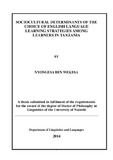| dc.description.abstract | This study examined the sociocultural determinants of the choice of Language Learning Strategies by the learners of English in the Tanzanian context. The study had hypothesized that gender, religion and learning context were significant determinants of this choice. To test these hypotheses, data were collected from a total of 549 respondents drawn from both secondary schools and one university. The data were collected through questionnaires, interviews and classroom observation. The t-test computed using the SPSS version 20 was used to test the hypotheses at the significant level of p≤.05 in the mean scores of the reported use of the Language Learning Strategies overall, the six strategy categories identified by Oxford (1990) and individual strategy items in relation to the three the independent variables of gender, religion and learning context. In summary, the results of the study are the following: first, in terms of overall strategy use, the learners studied were moderate strategy users (with a Mean of 3.4). Second, metacognitive and social strategies were reported to be the most frequently used strategies with means of 3.87 and 3.603 respectively while memory and compensation strategies were reported to be the least frequently used with the means of 3.14 and 2.909 respectively. Third, religion was found to be a significant determinant (t=3.641, df=508) while gender with t score of 1.824, df=508 and learning context (urban or rural) with a t score of -.0662, df=267) were not. However, learning context (university vs. secondary) was a significant factor (t=3.631, df=508). The results from the interviews and classroom observations “new” strategy items which were not in the SILL were noted: giving examples instead of the definition, describing the object or situation and the use discourse filler, specifically the Kiswahili word “nanili”. These three are compensation strategies. Others include: avoiding eye-contact, preparing and practising in advance and dressing decently. These latter are affective strategies. From the results, a number of pedagogical implications have been suggested. First, the most preferred strategies (metacognitive and social) would form the core of training of teachers of English who in turn train language learners. Second, material developer, instructors should tailor culture-appropriate materials and tasks. Third, since a number of learners were not familiar with some specific strategies, the teachers of English should be trained in strategy research and evaluation to be able to explore their students‟ strategy preferences and eventually instruct them on how to use strategies that are more conducive to foreign language learning | en_US |

